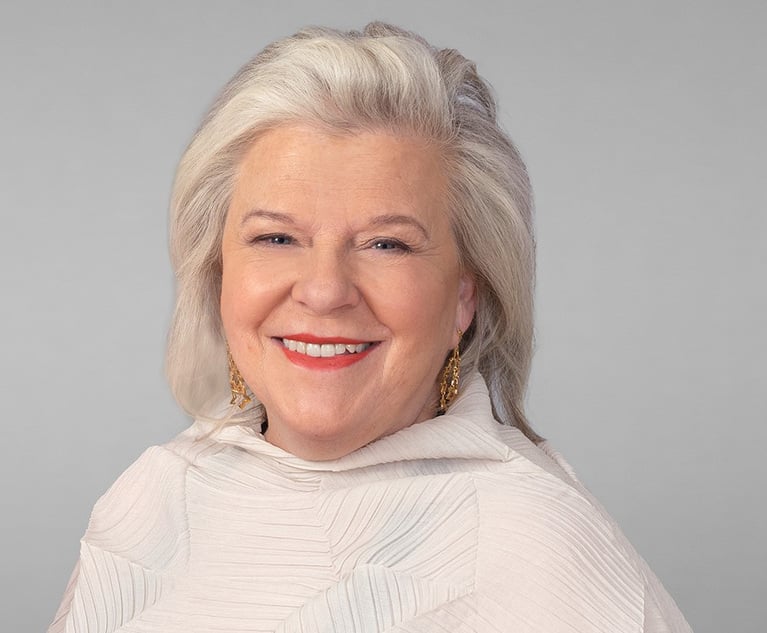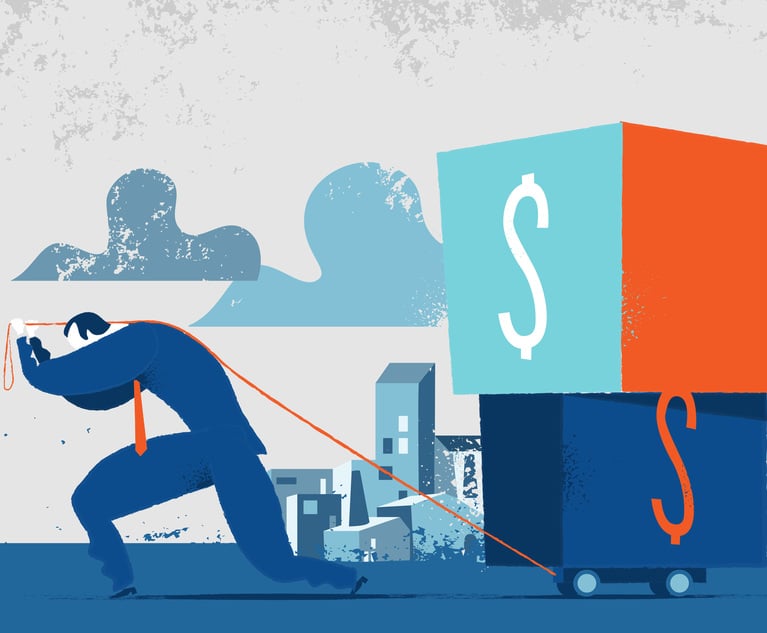 U.S. District Judge Kenneth A. Marra, Southern District of Florida.
U.S. District Judge Kenneth A. Marra, Southern District of Florida.The Jiujitsu Judge in the Epstein Affair
So sad; too bad, says judge to Epstein's victims.
September 18, 2019 at 04:09 PM
4 minute read
Who knew federal judges could be such teases?
I'm talking about U.S. District Judge Kenneth Marra of the Southern District of Florida who just made a punch-in-the-gut ruling in the continuing Jeffrey Epstein saga.
In February, Marra ruled that federal prosecutors violated the Crime Victims' Rights Act (CVRA) when they brokered the sweetheart plea deal with Epstein that basically let him treat prison as a sleep-away camp. (He was allowed to go to his office during the day.) Marra even harshly criticized former prosecutor Jim Acosta, contributing to Acosta's ouster as Trump's labor secretary. Hailed as a victory for the victims, the ruling was expected to set the grounds to invalidate the agreement and give Epstein's victims their day in court.
Well, the judge giveth. And the judge taketh away.
In the latest ruling, Marra told Epstein's victims they're out of luck—on just about everything. That means, no access to FBI records or grand jury findings on the Epstein investigation, attorney fees or a court-ordered meeting with Acosta—among other requests.
 But most striking was this: Marra refused to void the immunity granted to Epstein's alleged co-conspirators under the plea deal. (The plea explicitly granted immunity to Sarah Kellen, Adriana Ross, Lesley Groff and Nadia Marcinkova, who are accused of procuring underage girls for Epstein.)
But most striking was this: Marra refused to void the immunity granted to Epstein's alleged co-conspirators under the plea deal. (The plea explicitly granted immunity to Sarah Kellen, Adriana Ross, Lesley Groff and Nadia Marcinkova, who are accused of procuring underage girls for Epstein.)
Marra's rationale for this ruling: Epstein is dead, so the effort to invalidate his plea agreement died with him. OK. But what about the immunity granted to the alleged co-conspirators in the agreement? To justify that, the judge seems to perform legalistic jiujitsu. (Marra says that the request to invalidate the immunity "invites the court to render an advisory opinion," which is not allowed under the Constitution. Moreover, he says that the co-conspirators weren't party to the plea.)
I'll give Marra this—he was right on the money when he wrote at the conclusion: "So, despite petitioners having demonstrated the government violated their rights under the CVRA, in the end they are not receiving much, if any, of the relief they sought."
Let that sink in: The good judge acknowledges that the women were victimized by the system. But he's siding with the system. Huh?
George Washington Law School professor Stephen Saltzburg says Marra's decision was inevitable. "He didn't have a choice because crime victims had a limited time to object and seek redress—and that time has long passed," he said, adding that the CVRA "couldn't be clearer" on that point.
Which raises this question: If the statute is so crystal clear, why did Marra bother to ask the parties to file voluminous submissions about relief? "I can't figure out why," Saltzburg says. "It's a little odd."
Odd, indeed. If I were one of the victims, I'd feel that the court stoked my hopes, only to crush them to smithereens.
"This decision mirrors so much of what the case was trying to fix—the exclusion and silencing of victims in criminal justice," sums up Meg Garvin, the executive director of the National Crime Victim Law Institute (NCVLI).
I'm sure the victims' lawyers are seething too, though they're keeping it under wraps.
"After working so hard to hold the government accountable for the blatant violation of their rights, the order today did little to advance the Epstein victims' cause," says Boies Schiller Flexner partner Sigrid McCawley, who represents over a half-dozen of Epstein's alleged victims. "I am confident that the dedicated lawyers who worked so hard on this matter for over 11 years will seek review by the Eleventh Circuit."
That sure sounds like an appeal to this latest decision is in the offing.
And even though Marra would like his ruling to be the final word on Epstein's spectacular plea deal (Marra wrote: "This order brings to an end this lengthy and contentious litigation"), that's wishful thinking.
If anything, Marra probably opened up another can of worms.
This content has been archived. It is available through our partners, LexisNexis® and Bloomberg Law.
To view this content, please continue to their sites.
Not a Lexis Subscriber?
Subscribe Now
Not a Bloomberg Law Subscriber?
Subscribe Now
NOT FOR REPRINT
© 2024 ALM Global, LLC, All Rights Reserved. Request academic re-use from www.copyright.com. All other uses, submit a request to [email protected]. For more information visit Asset & Logo Licensing.
You Might Like
View All
Simpson Thacher Launches in Luxembourg With Hires From A&O Shearman, Clifford Chance
3 minute read

A&O Shearman's Former U.S. Co-Chair to Leave Partnership

Trending Stories
- 1Judge Denies Sean Combs Third Bail Bid, Citing Community Safety
- 2Republican FTC Commissioner: 'The Time for Rulemaking by the Biden-Harris FTC Is Over'
- 3NY Appellate Panel Cites Student's Disciplinary History While Sending Negligence Claim Against School District to Trial
- 4A Meta DIG and Its Nvidia Implications
- 5Deception or Coercion? California Supreme Court Grants Review in Jailhouse Confession Case
Who Got The Work
Michael G. Bongiorno, Andrew Scott Dulberg and Elizabeth E. Driscoll from Wilmer Cutler Pickering Hale and Dorr have stepped in to represent Symbotic Inc., an A.I.-enabled technology platform that focuses on increasing supply chain efficiency, and other defendants in a pending shareholder derivative lawsuit. The case, filed Oct. 2 in Massachusetts District Court by the Brown Law Firm on behalf of Stephen Austen, accuses certain officers and directors of misleading investors in regard to Symbotic's potential for margin growth by failing to disclose that the company was not equipped to timely deploy its systems or manage expenses through project delays. The case, assigned to U.S. District Judge Nathaniel M. Gorton, is 1:24-cv-12522, Austen v. Cohen et al.
Who Got The Work
Edmund Polubinski and Marie Killmond of Davis Polk & Wardwell have entered appearances for data platform software development company MongoDB and other defendants in a pending shareholder derivative lawsuit. The action, filed Oct. 7 in New York Southern District Court by the Brown Law Firm, accuses the company's directors and/or officers of falsely expressing confidence in the company’s restructuring of its sales incentive plan and downplaying the severity of decreases in its upfront commitments. The case is 1:24-cv-07594, Roy v. Ittycheria et al.
Who Got The Work
Amy O. Bruchs and Kurt F. Ellison of Michael Best & Friedrich have entered appearances for Epic Systems Corp. in a pending employment discrimination lawsuit. The suit was filed Sept. 7 in Wisconsin Western District Court by Levine Eisberner LLC and Siri & Glimstad on behalf of a project manager who claims that he was wrongfully terminated after applying for a religious exemption to the defendant's COVID-19 vaccine mandate. The case, assigned to U.S. Magistrate Judge Anita Marie Boor, is 3:24-cv-00630, Secker, Nathan v. Epic Systems Corporation.
Who Got The Work
David X. Sullivan, Thomas J. Finn and Gregory A. Hall from McCarter & English have entered appearances for Sunrun Installation Services in a pending civil rights lawsuit. The complaint was filed Sept. 4 in Connecticut District Court by attorney Robert M. Berke on behalf of former employee George Edward Steins, who was arrested and charged with employing an unregistered home improvement salesperson. The complaint alleges that had Sunrun informed the Connecticut Department of Consumer Protection that the plaintiff's employment had ended in 2017 and that he no longer held Sunrun's home improvement contractor license, he would not have been hit with charges, which were dismissed in May 2024. The case, assigned to U.S. District Judge Jeffrey A. Meyer, is 3:24-cv-01423, Steins v. Sunrun, Inc. et al.
Who Got The Work
Greenberg Traurig shareholder Joshua L. Raskin has entered an appearance for boohoo.com UK Ltd. in a pending patent infringement lawsuit. The suit, filed Sept. 3 in Texas Eastern District Court by Rozier Hardt McDonough on behalf of Alto Dynamics, asserts five patents related to an online shopping platform. The case, assigned to U.S. District Judge Rodney Gilstrap, is 2:24-cv-00719, Alto Dynamics, LLC v. boohoo.com UK Limited.
Featured Firms
Law Offices of Gary Martin Hays & Associates, P.C.
(470) 294-1674
Law Offices of Mark E. Salomone
(857) 444-6468
Smith & Hassler
(713) 739-1250










